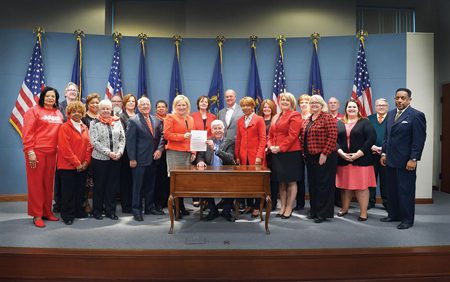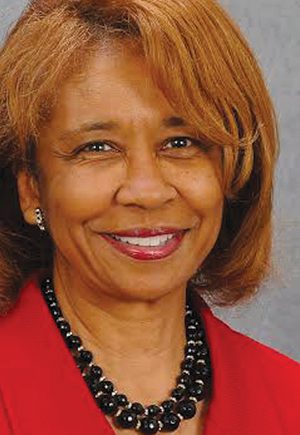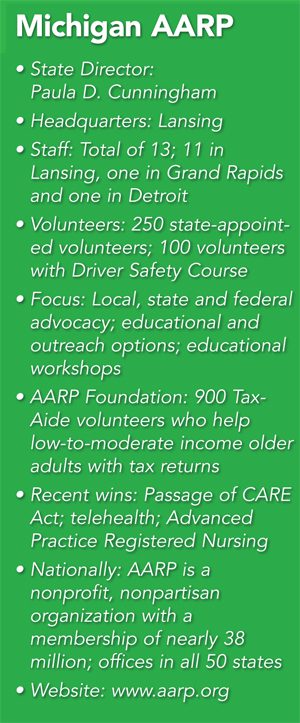

In an era where retirement has become optional and Baby Boomers are looking at their “golden years” as a fresh start, an organization that dates back to 1958 and which has its roots in an organization called the National Retired Teachers Association has become increasingly relevant.
It’s AARP—formerly the American Association of Retired Persons—that retains the focus on teachers as a division, describing itself as “America’s foremost network of 50+ adults and organizations with a passion and affinity for education and learning.”
In its modern incarnation, AARP advocates very much on both the national and state levels, including Michigan, where 1.4 million residents have membership.
In another era, Paula D. Cunningham, who joined the staff of AARP as state director in July 2015, might have been considering traditional retirement, but she’s embraced the role as a unique opportunity.
“It’s a great joy to come to work every day,” Cunningham said. “I work with a great team of people and volunteers who come in every day and ask, ‘How can we make a difference? How can we help?’”
Still, if you take a look at Cunningham’s resume, her professional path is hardly what you might describe as a straight line. Cunningham spent 25 years at Lansing Community College, where she was President from 2000 to 2006. She then joined Capitol National Bank in Lansing, making her the only African-American woman in the country to be president and CEO of a majority-owned bank.
Cunningham’s career makes sense when you think of your working years in a different way. Life isn’t about a job title; rather, it is a way to gain new skills that can be used in a variety of places across your personal and professional life. For example, she went from educating young people at Lansing Community College to Capitol National Bank, where she could give them the financial tools to make their dreams come true.
Applying her passion for people, her skills as a leader and willingness to learn to AARP feels like a natural transition.
“It’s come full circle for me. I’m exactly where I need to be,” Cunningham said. “I’m having a ball. I’m learning and I think I’m helping other folks learn and grow.”
AARP is a nonprofit, nonpartisan organization with a membership of nearly 38 million people. Its advocacy covers topics such as healthcare, employment, retirement planning, affordable utilities and protection from financial abuse. AARP has staffed offices in all 50 states, the District of Columbia, Puerto Rico, and the U.S. Virgin Islands.

Michigan’s organization is a dynamic group. It has run programs over the past year on a wide array of topics, from improving your digital skills for today’s job marketplace to family caregiving to improving your health with medical apps and wearable devices such as Fitbits and the like. Its goal is to engage with its members in real, substantial ways, both online and in the real world.
Cunningham says she feels passionate about AARP’s mission, which is to fight for and equip each individual with what they need to live their best life. It is a lofty social mission, combined with an ambitious advocacy agenda.
Following your passion is something Cunningham believes in deeply; it is not something she takes lightly.
“It’s my presence. It’s where I am. It’s who I am,” Cunningham said. “I always ask young people: ‘What do you want to do? What are you passionate about? What’s the burning in your belly telling you?’ Because if you’re passionate about your work, then you will love what you do and be successful at it. You will work and work until you reach your goals.”
That is why Cunningham focused the bulk of her career on education; she believes it is a huge economic driver for the United States. Helping educate the next generation of learners was a delight, she said. It also taught her how to listen to a variety of constituents to help them get their needs met, a skill that has come in handy at AARP as well.
 “Every day, I needed to have the resources in place to make sure 32,000 students at our college were about to learn. And those resources looked different for different students. That meant listening to everyone to find out what they needed, whether it was a student with disabilities or a student from another country,” Cunningham said.
“Every day, I needed to have the resources in place to make sure 32,000 students at our college were about to learn. And those resources looked different for different students. That meant listening to everyone to find out what they needed, whether it was a student with disabilities or a student from another country,” Cunningham said.
At AARP, finding ways to meet the needs of the organization’s members – most of whom are over the age of 50 – also requires curiosity, imagination and a willingness to admit you don’t always have all the answers.
“I learned quickly,” Cunningham laughs. “That’s the secret – you always have to be available to learn something new. I never assume, ‘I got this.’ I don’t use those words. The more you learn, the more you realize there is to learn. There’s always opportunities for growth. That’s why I always say I am the hardest worker in the room; I’m always willing to learn.”
A surprising fact is that AAPR Michigan has only 13 staff people; the bulk of its work is done across the state’s communities by volunteers. Michigan has about 200 people who do everything from see a bill through to the Capitol steps to doing programs at local libraries to working within their cities to make AARP programs come to life, Cunningham said.
“Our work and our impact is due to the volunteers in the community who have stepped up and want to be a part of this to help,” Cunningham said. “We could not have the impact that we do without them.”
Because AARP focuses on the needs of older adults, Cunningham said the issues are complicated and typically do not have easy answers. AARP touches on issues ranging from food, taxes, transportation, safe streets, veteran affairs, small business, Medicare, Social Security and much more. These issues affect people’s quality of life, so they’re key topics for AARP, she said.
But there also are quality of life issues that are relatively new to older adults, such as thinking about a second career, volunteering, travel and relationships.
“The older adult of today is not the older adult of years ago,” Cunningham said. “We’ve disrupted aging. People are living so much longer now that health and quality of life are more important than ever. … People at age 50 and 60 need help thinking about the kind of life they want to have in the second half of their lives. You’ve done everything for everyone else; consider what you want to do now for you.”
Cunningham has enjoyed the fruits of her labor over the years. For example, she was the first female president of Lansing Community College; the main building on the LCC campus was officially named the Paula D. Cunningham Administration Building in 2006. She was inducted into the Michigan Women’s Hall of Fame in 2013 for her business and community service. Cunningham also was the first African-American female to chair the board of the Lansing Regional Chamber of Commerce.
Another highlight came in September 2016 when Cunningham was recognized as “a pioneer in business and education in the Lansing community” and received the Trailblazer Award from the Michigan Congressional Black Caucus at the Mead Center for American Theater in Washington, D.C.
But her ultimate goal then and now at AARP is to help—and to try to make a difference for everyone she meets.
“That’s been my mantra throughout my life. I feel like I’ve been very fortunate,” Cunningham said. “I’ve never sought these positions out. I never had it in my mind to be president of a college or head of a bank. I never dreamt that.”

Anytime she hesitates, though, Cunningham remembers her own advice of the importance of learning and respecting your passion. She also recalls a mentor who sat her down when she paused before accepting the leadership role at Lansing Community College.
“I didn’t want to leave the classroom,” Cunningham admits. “But my mentor said to me: ‘Just think of the impact you can have if you’re not just in the classroom with 32 students but as a teacher to 32,000 students.’ That was my ‘a-ha’ moment. You’ve always got to be thinking a little bigger and reaching a little higher.”
So if fear paralyzes you, Cunningham says of one of her favorite quotes, you don’t need to be scared of the butterflies in your stomach. You simply need to teach them to fly in formation.
Her goals for the next few years are sky high – Cunningham said she wants to grow AARP in all aspects. Among her biggest self-imposed tasks is to double Michigan AARP’s membership, taking it over 2 million during her tenure. She also wants to encourage people to learn about the group, which she believes serves as a larger voice for older adults across the state.
“We listen to our members; your voice is heard. And we can amplify that voice and advocate on your behalf,” Cunningham said. “It’s about legislation and the impact it can have on your life.”
One of her proudest moments at AARP Michigan was when the organization helped bring the Michigan CARE Act into being. The new law, which took effect in July 2016, makes sure caregivers are recognized as such and can have a say in the care of the people they help on a regular basis.
The Michigan Caregiver Advise, Record, Enable (CARE) Act supports and equips family caregivers with the basic information and training they need when their loved ones go into the hospital and as they transition home.
Michigan became the 25th state to adopt the CARE Act. The Michigan CARE Act is intended to help families when a loved one is admitted to a hospital by ensuring that hospitals record the name of the family caregiver; notify the family caregiver when the patient is going to be discharged back home or moved to another facility; and provide instructions to the caregiver about any medical tasks he or she will need to perform when the patient comes home.
In Michigan, there are 2 million caregivers at any point in the year who devote 1.4 billion hours in unpaid care to loved ones at a total value of $15.5 billion, according to a report by AARP’s Public Policy Institute.
“Before the CARE Act passed, the caregiver might go to the hospital with someone they took care of and get no information at all; the patient couldn’t say who their caregiver was (if they were not a relative or spouse),” Cunningham said. “This new law makes me so proud. It allows the patient to say who their caregivers are and the hospital can release that information to that individual. It’s going to have a significant impact on people’s lives.”
Cunningham hopes that she can help communicate AARP Michigan’s many educational opportunities as well. For example, she wants more people to take advantage of AARP’s workshops for people over 50 who want to have great relationships, physically and mentally. So if that means members want a sex-education class, then so be it.
“It’s a fun, informative and safe environment to talk and connect. That can have a significant impact on people’s quality of life,” Cunningham said.
Personally, Cunningham has goals as well. One of them is to go back to school. She recently told her husband that she wouldn’t mind getting a PhD. After all, she still has work to do, and she plans on being around to do it for many, many years to come.
“Why? Other than I don’t have it,” Cunningham said. “I just love that environment of continuous learning. Maybe I’ll get a law degree. I don’t want to practice the law; I just want to learn, to keep my brain stimulated and stretch. I’ll try whatever can do that.”








